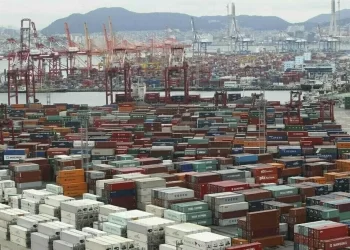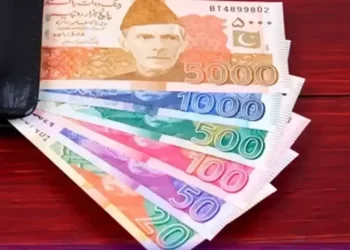LAHORE: The Federation of Pakistan Chambers of Commerce & Industry’s Businessmen Panel (BMP) on Sunday advocated the need for raising the country’s tax base so that tax-to-GDP ratio improves as the tax shortfall may further widen to almost Rs 400 billion at the end of 2024.
The BMP chairman and FPCCI former president Mian Anjum Nisar urged the trade officers to explore opportunities to diversify exports of goods and services in their respective areas, asking them to meet the challenges faced by Pakistan in European markets.
He observed that against the target of Rs 4.64 trillion, the FBR collected Rs 4.29 trillion in five months, achieving a growth of 23%. It needs a 40% growth to reach the annual goal of nearly Rs 13 trillion. He said that the IMF will assess December’s tax collection before deciding on bringing a new tax-loaded budget. So, the condition of IMF to rope in agriculture income in the tax net appeared promising in enhancing the tax collection. Otherwise the whole burden will again be shifted to the industry.
The FPCCI former president said that country’s major export markets did not see any significant growth in importing goods from Pakistan in the financial. He also suggested the ministry to devise strategies for promotion of Pakistani products, calling upon trade officers to take advantage of opportunities offered by China-Pakistan Economic Corridor (CPEC).
He recommended the broadening of tax base through appropriate legislation to ensure that all income earners pay taxes equitably, including agriculture income.
Mian Anjum Nisar said that Pakistan’s exports to the US and the UK, two high-priced markets, have seen substantial growth in the first quarter of the current financial year. However, exports to China have sharply declined during the same period, according to country-specific data released by the Trade Development Authority of Pakistan (TDAP).
The UK has overtaken China to become the second-largest export market for Pakistani products. The US remains the top export market for Pakistan, with exports to the country crossing the $ 1.3 billion mark in the second quarter. Exports stood at $1.34 billion, compared to $ 1.34 billion in the same quarter of the previous fiscal year, registering an 12 percent increase.
The UK ranked second, importing $ 580 million worth of Pakistani goods, reflecting a 14 per cent growth compared to $ 509 million last year. Exports to China, however, saw a decline of 23 percent, falling to $ 559 million from $ 730 million in the same quarter of the previous fiscal year.
In addition to the US and UK, Germany, the United Arab Emirates (UAE), the Netherlands, Spain, Afghanistan, and Italy were also major export markets, with exports to each of these countries surpassing or nearing the $ 300 million mark.
Exports during the July-Oct period of FY25 were recorded at $ 7.85 billion, compared to $5.92 billion in the same period last year. Textile exports were the largest contributor, totalling $ 4.75 billion in the first three months of the current fiscal year.
The BMP Chief pointed out that administrative measures to curb imports, leading to raw material shortage for the industry and resultantly lower production, were the main reason for the plunge while the slowdown in global demand amid monetary tightening was another reason, he said.
He said that Pakistan has remained a potential market for foreign investors, who still have plans to make fresh investment in the country, but they have continued to wait for the return of economic stability. He highlighted uncertainty in the rupee-dollar parity as one of the major concerns of foreign investors.
He expressed dissatisfaction with provinces’ delay in passing new agriculture income tax laws. This new legislation is one of the conditions agreed upon with the International Monetary Fund as part of the 37-month $ 7 Extended Fund Facility.
He said that the federal government has also expressed dissatisfaction with the poor pace of adopting agricultural income tax legislations by Sindh, Khyber Pakhtunkhwa, and Balochistan. Punjab is the only province that has enacted the bill through its provincial assembly.
He said that it’s a long way when the bill will turn into law and the revenue starts supporting the tax net.
Undoubtedly, there is a significant progress, both on fiscal and current accounts, showing surpluses and could lead towards a sustainable point.
He said that culture of amnesty schemes should be eliminated as it discourages the honest taxpayers, besides enacting penalties in the law to punish tax evaders.
“Appropriate laws should be made to enable the government to seize local assets, in equivalent value, or levy appropriate taxes, if any person holds any kind of assets outside the country for which source of income could not be established” he added. He said that export-oriented industries should be facilitated. He was of the view that rules, regulations and procedures for export-oriented sectors should be easy so that it could play its due role in economic stability of the country.
“It is a matter of concern that exports are showing a low growth besides the fact that country has all resources which is not a good omen,” he maintained.
Copyright media, 2024









